
What are you reading right now? What do you think of it?
What have you read so far this year, and what are you going to read next?
> last one: >>238 (https://archive.md/chbSl)

So far so good, I've read the first two chapters. In some sense much ado about nothing, but admittedly the prose is starting to get to me. I'm going to finish it though.
>>3265
It's actually my first Ishiguro. I'm going to wait until I'm done reading it before judging his writings.
I do plan on reading more of his work.
Giovanni's Room by James Baldwin. I'm only about halfway through. I would describe it as ahead of its time, but not really in a good way. A lot of it feels cliche and like it's trying to be pretentious but failing somehow. There's not really much to analyze besides David's internal struggle between appearing masculine/straight and being with Giovanni. I guess the biggest themes are the stigmas of gayness and false appearances. Obviously Giovanni offs himself so I hope it's not as straightforward as only being because David leaves him.

Has anyone here read the Farseer trilogy? I was thinking of reading it next as I'm currently on a fantasy binge.

>The symposium began with organizer Anthony Uhlmann reading out a prepared statement from Murnane while the writer stood by tight-lipped; he would be present during the breaks and at the end of the day but was under no obligation to stay for the papers. Murnane didn’t stay, at least not for the first session. During the second session, he lingered in the bar, pretending to read the newspaper. During the third, he collected empty beer glasses and tinkered at the sink.
I'm thinking he's based. In any event, he BTFOs Rushdie and other such popular writers

>The writer lives in a single room, where he sleeps on a folding cot among his “archives”, including filing cabinets full of notes, diaries, and early drafts of his books. These files have unusual titles: “I decide that most books are crap”; ; “My hatred for literary critics”, and: “Peter Carey exposed at last.”
>Murnane prefers not to travel. He has never left Australia or flown in an aeroplane, he doesn’t appear at writers’ festivals, and has only ventured outside Victoria a handful of times. He has not watched TV or movies for decades, and has never used a computer – although he has recently acquired an iPhone on which he sends epistle-length text messages.
>Instead, he spends his downtime with several complex games, which he’s developed and played throughout his adult life. The most famous of these is “the Antipodean Archive”. It’s a vast and complex horse-racing game set in two imaginary countries called New Eden and New Arcady.
>Murnane has no sense of smell (to which he attributes his synesthetic perception of colour) and a prodigious memory. Before giving a recent talk, he recited every winner of the Melbourne Cup in order.
Currently reading a press copy of Shadow Ticket.
Started reading the Upanishads last night, will probably try to finish reading Envy by Yuri Olesha this weekend, and then start knocking down the remaining Chekhov plays on my list (already finished The Seagull).
Yesterday I read a short story from 1799 on the moral pitfalls of gambling called The Lottery. Very overly-literal and straightforward but sort of charming because of it.
Starting a book about cryptography called The Code Book. Written in a pretty unremarkable style but has some interesting historical anecdotes.
Finished "Serpent's Walk" by M.A.R. Barker. Read it because "crypto-Nazi professor of Urdu and favorite gamemaster of Dave Arneson writes a propaganda novel under a pen name about the reemergence of the Nazis in the mid-21st century, published by the same people as the Turner Diaries" was too interesting to pass up.
As a work of literature, it falls very, very short. Better written than Ayn Rand, but not by much.
The speculative content though is exceptionally prescient (written in 1991) and you can see how its politics directly influenced the early BBS culture and ultimately /pol/ as well as other things downstream. You can draw a straight line from it to Sheldon Pacotti and Deus Ex, which I think is the most interesting takeaway from it. Also, makes me wonder about Elon Musk's obsession with Deus Ex, Walter Musk, and Maye Musk née Haldeman.
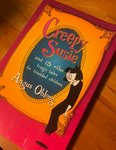
Got pic related today, short read with sketches
I've had four midterms in a week, so I haven't actually read for pleasure in some time.
The last book I finished was Las multitudes argentinas, by a politician of the XIX century.
Now I'm going to read The Book of All Books (Calasso).
Moby Dick with the rsbookclub group.
If you guys dislike a book you're in the middle of, or grow to find it a slog, do you drop it or push through?

>Twenty years ago, when I first arrived on the plains, I kept my eyes open. I looked for anything in the landscape that seemed to hint at some elaborate meaning behind appearances.
>My journey to the plains was much less arduous than I afterwards described it. And I cannot even say that at a certain hour I knew I had left Australia. But I recall clearly a succession of days when the flat land around me seemed more and more a place that only I could interpret.
/int/ et al screwed me up with Finns like modern day pan-rightism is fucking up youths' relationship to Jews and Indians; every time I encounter a Finnish person I have to physically bite my tongue to not blurt out mispronounced Finnish cursewords that were the apex of humor in 2011
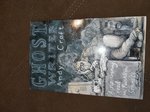
been getting more interested in strict longform verse recently (epic poems, verse novels). not many good ones were written (or translated well enough), and it seems like much of the late 20th century revival centered around free verse rather than stricter meter and rhyme. currently digitizing picrel, going to make an epub but ive been having fun figuring out hocr, bulk image processing and everything else to make a good scanned pdf. i would recommend this book, either buying the physical version or waiting a couple weeks for my versions to pop up on annas' archive. also just bought another book by croft that i plan to digitize, its described as an epic poem so i hope he can pull off more gravitas this time
Who else /brandonsanderson/ bros? He's pretty based :-) actually a great writer great sense of STYLE literature is SAVED

Reading Xenosystems. It has been alright so far, the prose is mechanical. As someone who was a red blooded communist through the 2010s, it's very interesting to see what the 'other side' was up to during that time.
I got The Search of Lost Time. This is my planned summer read (and probably autumn, winter, and some other seasons). I figured there was no reason to wait anymore to read what is supposed to be a masterpiece.
I just hope I'll be able to stay that long with the same book.
I've been reading La derecha argentina and a biography of Savitri Devi. For fiction, I'm reading Tía Juia y el escribidor.
I'm reading "The Assertiveness Workbook" by Randy J Patterson. I have struggled to say no, set boundaries and speak my mind for most of my life, and would love to break free of the habits and chronic need to be agreeable at the cost of my own self-respect. I have checked out "When I say no I feel guilty" by Manuel J. Smith but a lot of the examples provided don't seem very effective.
In French. That's also why it would be ridiculous to not read it. I dread reading Joyce, but Proust wrote in my mother tongue.
Reading Chesterton's New Jerusalem. It's dated but funny, even if most of his reasonings are pleasant rather than solid.
>Sanctity was the light of the Dark Ages, or if you will the dream of the Dark Ages. And democracy is the dream of the dark age of industrialism; if it be very much of a dream. It is this which prophets promise to achieve, and politicians pretend to achieve, and poets sometimes desire to achieve, and sometimes only desire to desire. In a word, an equal citizenship is quite the reverse of the reality in the modern world; but it is still the ideal in the modern world.
I have began the third and final entry of a mystery visual novel series.
Started The Trial. I don't know why I stopped reading Kafka after finishing The Transformation.
At the moment, I have been rereading Peter Watts' 'Sunflower cycle'. It totals four short stories about a group of posthumans within a spaceship, which circumvents the galaxy building incremental warpgates. A rudimentary AI, engineered to a certain low level of intelligence in order to be predictable, and relying on human meat in times of crisis. Of course, a mutiny was involved. Three of the four stories include the same PoV so many of the thousands are forgotten. The science being QUITE hard has made it much more enjoyable. I notice I tend to reread books after about a 5 year gap and retain more after.
Previously and throughout, I have been reading
>the cultivation webnovel A Will Eternal
a much more linear direct traversal throughout its world (thus far, in its sixth book) compared to its predecessor I Shall Seal the Heavens. It does feel like pulp so I bounce back and forth.
>finished the Unwilling God trilogy
A small self-published series, the third direct trilogy to feature one, maybe two of its protags. Very much includes a messiah-like deity in the form of a natural mage, a human healer who is much more than he appears. It takes place within a small sword and sorcery world that the author wrote many other stories in, which I adore. I went in believing that this may be the last of the Ursian chronicles but there is hope for the future. The author's personal life seems healthier too. I believe he lost his dog and wife in the same year--2014--and now mentions a girlfriend on his blog. I wish him the best.
I saw a dog in the middle of the road today in a busy area and felt heartache.
>reread the final ~30% of Dungeon Crawler Carl
I believe the author has grown too successful to finish this series within any timely manner now.
anyone going to do the rs gravitys rainbow project?
I finished reading Nietzsche's The Birth of Tragedy. Liked it. It's an interesting difference from the first book of his I read, Beyond Good and Evil. More academic in style, but it has a little glimmer of his more prescriptive and bombastic prose. I find the thesis very interesting and insightful, that of the Apollonian and Dionysian undercurrent which fuels the human arts.
Now I am reading Bed by Tao Lin. Not sure whether I like it or not yet.
Listened to an audiobook of Mishima's Sun and Steel on a little roadtrip. It was my first Mishima. A lot of interesting concepts, with a kind of plodding "plot." I especially enjoyed the muscle/body as mind idea, and the way that that is explored.
I would like to read his novels next, of course.
Rosas bajo fuego. The guy was having a hard time, amirite?
DNF'd Knausgaard's first autobiographical book around 70% of the way through. He's a good writer but I keep expecting some greater philosophical or analytical conclusion, which obviously floats in the air as he describes the society around him, but which he is just a few degrees short in analytical brainpower to synthesize. Even the basest of writers will tack some sort of bow on top of their take on the world but he seems almost to be allergic to higher order analysis.
He said he was going to be writing a book which involves the Norwegian black metal scene as a backdrop, but goes on to call it 'death metal' in an interview. Not a good sign...
There were also some weird translation bumps in the English version, such as never translating 'gate' into 'street', thereby ensuring that the majority of the readership will literally picture the English 'gate'. I don't know why the author never left in some Norwegian phrases or swearwords. Didn't this used to be standard? I hate how we've gone from academics putting in entire French or Latin paragraphs to this shit.
Erm, translator, not author. Sorry...
230/930 pages into Ulysses, what do I think of it?

Read "Discognition" by Steven Shapiro. It's a collection of a dozen or so vignettes about how different types of cognition come to be or can be analyzed. The author uses examples from science fiction short stories to illustrate this gamut of possibilities. For me this fell quite short of that promise. First off, the book comes across as more of a list of book reviews and summaries more than it does exploring the topic on its own, and at some point you wish for the author to add some sort of independent critique, or overarching theme to the book, instead of leaning so much on the stories themselves. Taken together as multiple chapters of a whole, it comes across as a collection of blogposts of reviews of books that happen to share a theme, rather than a book that starts and finishes with set conclusions.
The author's heavy starting bias in the contemporary western secular tradition hurts this theme. He insists on rigidly sticking to science fiction short stories and not even touching any non-materialist position of cognition, qualia, or consciousness with a ten meter pole. The worship of science fiction in particular becomes a sort of fanaticism as the author bestows nearly magical powers onto it. He calls science-fiction "extra-philosophical" because it can describe things that philosophy can't, in a chapter about a story that was not even published as a science fiction story but a philosophical what-if: if a woman who had lived her entire life in a black and white box stepped out for the first time and saw the color red. No conclusion is actually drawn besides praising the story for being mind-opening as to how we perceive things. Imagining how another being might perceive the color red isn't extra-philosophical, it's just plain philosophical. Not so special when we put these questions into context of the same old shit we've been putting to mind since Antiquity.
The author makes a lot of stale references that anyone who has spent time online will recognize such as the yellow slime mold and Tokyo subway system Cool Fact - it becomes the basis of an entire chapter. What happened to all this hype about science-fiction being so mind-expanding if you can't even give me a few pithy Flatland-like paragraphs of how it must be like in the first person to navigate the world as a slime mold? Your average loser druggie who's taken too much acid has a more profound take on the possibilities of different cognition than the author who comes across as soberly boxed into material reality, yet seemingly subconsciously reaching for something "beyond". All in all not worth your time unless you are a literal reddit fedora atheist still stuck in your ways of ten+ years ago.
I'm reading Understanding Media by Marshall McLuhan and somehow this is the second time in a row that a book I'm reading keeps making references to William Blake's poetry in contexts that appear entirely unrelated. The first was Ray Peat's Mind and Tissue which I picked up on a whim to figure out why people were so into him online. Both authors also seem to have a habit of rapid firing assertions on strange tangents. I think I might just be bad at picking books to read.
i'm reading william vollman's the dying grass right now. it's certainly hefty, and i often find myself looking up figures and events in the book since i'm not too familiar with the nez pearce war besides the crash course everyone gets in high school, but it's an incredible work that is incredibly well researched. i'm not a fan of the military command sequences though, literal pages of troop orders upon troop orders. regardless, i highly recommend it. kinda gives me a joyce-like impression although it's certainly more readable.
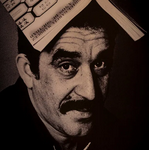
After many years of attempts, false starts, breaks and derelictions I have finally gained momentum and am blitzing through Marquez's Autumn of the Patriarch. Under the guise of a small booklet lies this ferocious beast of literary work, this dense soup-like stream of consciousness about and of anonymous LATAM dictator whose life spans centuries and of disaster zone that is both country he rules and himself. It's so dense, this book is like like deep swamp hidden by reeds and tall grasses.
And I love this book so much, for how it is so funny yet so dismally sad, so vulgar and sublime all the same.
Working my way through Curvy Girls Can't Date Quarterbacks right now. Fourth Wing and Will to Change in my backlog, up next

>But I don’t know how to capture what takes place except by living each thing that now and at the instant happens to me and it’s not important what. I let the horse gallop free, fiery from pure, noble joy. I, who run nervously and only reality delimits me. And when the day comes to an end I hear the crickets and I become full of thousands of tiny, clamouring birds. And each thing that happens to me I live here, taking note of it. Because I want to feel in my inquiring hands the living and trembling of what is today.
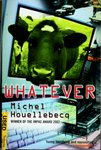
Just started Whatever by Houellebecq, and I'm only a few chapters in but already in love with his style. I hope his other novels are just as good; I'll definitely be bingeing them!
Melville’s “The Encantadas” — Really beautifully written musings about the Galápagos Islands. My favorite so far is his description of the primordial religious ecstasy of seeing the giant tortoises for the first time:
“…behold these really wondrous tortoises -- none of your schoolboy mud turtles, but black as widower's weeds, heavy as chests of plate, with vast shells medallioned and orbed like shields, and dented and blistered like shields that have breasted a battle, shaggy, too, here and there, with dark green moss, and slimy with the spray of the sea. These mystic creatures, suddenly translated by night from unutterable solitudes to our peopled deck, affected me in a manner not easy to unfold. They seemed newly crawled forth from beneath the foundations of the world. Yea, they seemed the identical tortoises whereon the Hindu plants this total sphere. With a lantern I inspected them more closely. Such worshipful venerableness of aspect! Such furry greenness mantling the rude peelings and healing the fissures of their shattered shells.
David Graeber’s “Debt: The First 5,000 Years” — Interesting second chapter about how the first tool of transaction in human societies was not barter, as posited by mainstream economists, but rather debt — as in, Michael gives a pair of shoes to Joe, & henceforth the whole village knows that Joe is indebted to Michael. Joe will give Michael a good, or perform for him a service, some time in the future. Money developed later on, & was first used primarily not as a means of exchange but as a unit of account in calculating debts between parties.
Reading through a book I found at a little free library, "Prize Stories 1991 O Henry Awards." Updike's "A Sandstone Farmhouse" is first prize. They're mostly just easy reading short stories, but I've liked the Joyce Carol Oates and Le Guin submissions, and a surprise Sukenick which I found interesting.
>reading book
>decide I don’t like it
>tear it in half
does anyone else do this?
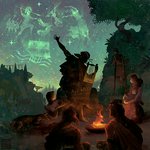
Just finished reading Kingsley Amis' Lucky Jim and I really liked it. I'm not too familiar with '50s fiction besides the Beats and I was pleasantly surprised by how well the humour has aged; it's literary slapstick. Takes a while to get into things but I found myself racing through the pages the closer I got to the end.
Next up is the Odyssey, translated by Robert Fitzgerald. I read the Iliad (Lattimore translation) a couple months ago and it showed me the meaning of "epic" poetry. Toweringly beautiful is the only way I can describe it. The part where Hector meets his wife and son was heartbreaking, the strange thrill of the night encounter in Book 10, the description of Achilles' shield, the image of Diomedes charging at the gods themselves, the visual of a war-clad Athena descending from Olympus to the battlefield, the countless pieces of armour clattering upon the dead as the light leaves their eyes, even the Catalogue of Ships, just so many things in it that have stayed with me. The final line of the poem made me tear up, I'm not embarrassed to say. I'm getting goosebumps again just thinking about it. That almost 3000 years after his time a blind bard from the Mediterranean is still bringing such joy and sadness to people all across the world, it's such a beautiful thing. Every so often I read something that really reminds me why I've been addicted to books since I was a kid, really makes me believe in humanity again, at least for a while. Makes you wish you could meet him and thank him you know? Needless to say, my expectations for the Odyssey couldn't be higher.
Been reading The Hobbit recently, almost done with it now. I haven't read it since probably the 3rd grade, I don't recall if I actually read it front to back then. I find it a pleasant read, but actually find Tolkien to be a worse writer than I anticipated. I've been told that The Hobbit is the least interesting of the Lord of the Rings "series," but it doesn't make it really want to continue with him right away. Tolkien seems to write in a strangely dry way, almost fairy tale like, but lacking a kind of whimsy that can make a fairy tale compelling to read even as an adult.
the brothers karamazov, i like it so far, more jolly than other russian lit ive read
reading moby dick finally. on a part where Melville is writing at length about the differentiation of the different whales. great stuff.
Found a book by Paul Theroux (translated). When I saw the author's name, I thought oh haha that reminds me of Louis Theroux, but there's no way they're actually related and it's just my uncultured retarded brain making that connection. Nope. It's actually his father. Loll
Steppenwolf. It's quite interesting to compare the life of the protagonist with mine own. It's a nice thing to be able to read German.
I would like to read Faust, it was too difficult last time I tried.
I've read the majority of Buch der Lieder so I may as well finish it.
Also the Iliad.

I liked this Brecht play. Not only is it very funny, the "moral" at the end is quite fitting for the modern era of politics.